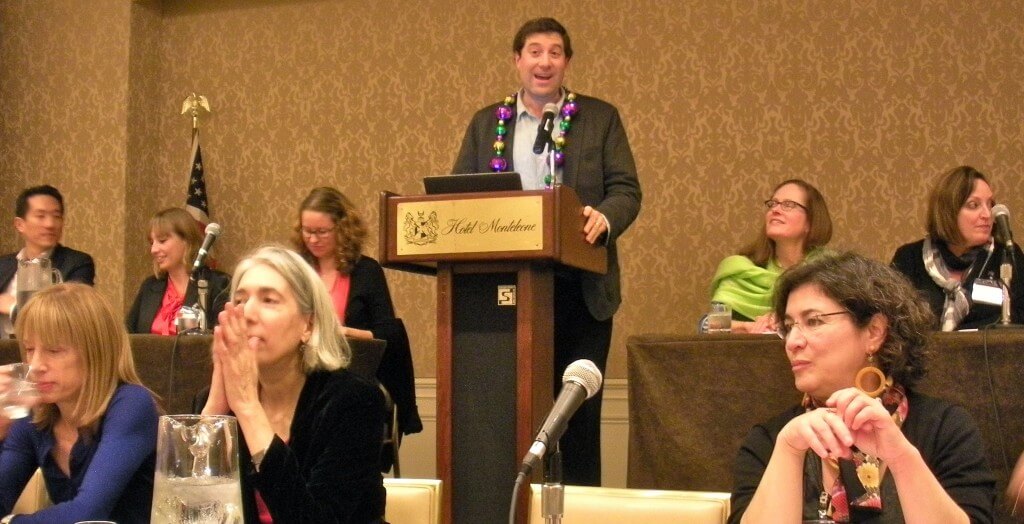 Our favorite panels at the writer events we attended this past year were those featuring agents and editors. This coverage, Part 2 of 4, is from the Agents & Editors panel at Words & Music: A Literary Feast in New Orleans, moderated by Folio Literary Management’s Jeff Kleinman.
Our favorite panels at the writer events we attended this past year were those featuring agents and editors. This coverage, Part 2 of 4, is from the Agents & Editors panel at Words & Music: A Literary Feast in New Orleans, moderated by Folio Literary Management’s Jeff Kleinman.
A brief bio of each agent/editor featured appears at the bottom of this post.
Jeff Kleinman: The submission process goes hand in hand with the rejection process. So let’s talk about rejection for a moment. For instance, what are your most common reasons for rejecting a manuscript?
Jackie Cantor, Editor: Oh, that’s such a hard question! I’m really a sucker for voice; I love voice. I feel like you can fix pacing and you can fix plot but you can’t really make a voice different from what it is and if it isn’t there then that’s probably the biggest reason that I turn things down.
Brenda Copeland, Editor: For me it’s three things and I absolutely agree about voice and I would define voice as the personality of the book and voice is probably the biggest element next to plot, or side by side with plot because a lot of writers rely on voice and lack direction to the story and that’s a huge mistake. I also want a writer who knows who his reader is. Especially first time writers; think about what you want to write and not what people want to read. When you’re writing, you need to think about what you’re writing, but when it gets to me that’s when the reader gets involved.
Ryan Doherty, Editor: I think that if the idea is not unique enough, if it’s been done before, if it’s coming from a person that’s not really suited to write that book. And the writing. If it’s not new enough or not done well enough. I do non-fiction. So if I’ve read it before or it’s not done in a fresh way, then…
JK: A lot of agents and editors write back to the author, “I didn’t quite fall in love with the project.” What do you mean by that, in plain English?
Brandi Bowles, Agent: You said plain English so the most simple way I can put it is, do I want to keep reading? Do I get on the subway and continue reading? Do I miss my stop because I’m reading? Then I’ve fallen in love.
Susannah Porter, Editor: From an editor’s point of view you’re going to live with this book for a long time, a long time. You’re going to read the book five times. Are you going to be with it that much, starting with the acquisition process because that’s really difficult these days so you have to fight for it and then you have to win the auction and then you have to live with the author for two or three years or more. So you have to love it.
JK: For the editors, what book crossed your desk that you passed on and now most regret passing on?
Amy Gash, Editor: I know that book I didn’t get, Marley and Me. I didn’t spend quite enough money. But everything I’ve passed on, I’m sure it’s gone on to nothing (laughs).
Ginny Younce, Editor: Sometimes I see one that I passed on that’s gone on to be published beautifully but then I think that well, I couldn’t have done that; I didn’t have the heart for that book, I didn’t have a vision for that book. If I’m not ready to do what Susannah beautifully described, to fight in the corner, then I’m not supposed to have that book in the first place.
Webster Younce, Editor: Regrets? I’ve had a few, but then again, too few to mention. I think there are books that I’ve regretted passing on because of the success they’ve had. But as an editor you have to rely on your judgment and it is a subjective thing but it is your judgment and you have to feel right about it. I passed on a story collection by a writer, a major success and many people liked her very much; I did not. Still do not (laughs). So I regret passing on that success, but I don’t regret passing on the book.
JK: And how often do you say no because of writer’s attitude?
Deborah Grosvenor, Agent: We call them LTS’s, “life’s too shorts.” If it takes six months to negotiate the agency agreement for example, that’s a good sign.
Brandi Bowles, Agent: If they don’t trust me. Part of our job is to be your sales agent but also your career manager and trust is absolutely vital to being able to work together. So when I start to get that feeling that they’re questioning every suggestion that I make then I pull back on the relationship.
Jill Marr, Agent: If they check in a week after they send manuscript. Be reasonable. And if you don’t trust me. It’s a marriage and we’re in it together and if you don’t make anything on this book then neither do I!
The Panelists (Listed Alphabetically)
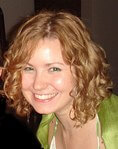 Brandi Bowles is an agent at Foundry Literary + Media, a full-service literary and media-development agency in New York. Brandi represents idea and platform-driven nonfiction in all categories, but she’s particularly interested in humor, narrative nonfiction, and big-idea books that change the way we think about the world. Some of her upcoming books include The Hollow Bone: Secrets From the Life of a Reiki Master, The Vice Lords: A History of Wayward Writers, and a memoir from Youtube sensation Ted Williams. Brandi also represents literary fiction, commercial fiction, women’s fiction, and YA, particularly novels that feature strong female bonds, and psychological or scientific themes.
Brandi Bowles is an agent at Foundry Literary + Media, a full-service literary and media-development agency in New York. Brandi represents idea and platform-driven nonfiction in all categories, but she’s particularly interested in humor, narrative nonfiction, and big-idea books that change the way we think about the world. Some of her upcoming books include The Hollow Bone: Secrets From the Life of a Reiki Master, The Vice Lords: A History of Wayward Writers, and a memoir from Youtube sensation Ted Williams. Brandi also represents literary fiction, commercial fiction, women’s fiction, and YA, particularly novels that feature strong female bonds, and psychological or scientific themes.
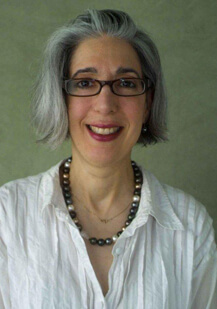 Jackie Cantor is an Executive Editor at The Berkley Publishing Group, a division of Penguin. Prior to joining Berkley in August 2005, she was a Vice President and Executive Editor at Bantam Dell, where her list included a wide variety of fiction and nonfiction titles in all formats. She is proud to have discovered the New York Times bestselling authors Diana Gabaldon and Eloisa James. Other major authors whose work she has acquired include John Grisham, John Lescroart, and Hope Edelman (Motherless Daughters). Two of Ms. Cantor’s current clients—Laura Brodie (Novella) and Lucy Ferris (Novel)—are former winners of the Faulkner Society’s gold medals for literature.
Jackie Cantor is an Executive Editor at The Berkley Publishing Group, a division of Penguin. Prior to joining Berkley in August 2005, she was a Vice President and Executive Editor at Bantam Dell, where her list included a wide variety of fiction and nonfiction titles in all formats. She is proud to have discovered the New York Times bestselling authors Diana Gabaldon and Eloisa James. Other major authors whose work she has acquired include John Grisham, John Lescroart, and Hope Edelman (Motherless Daughters). Two of Ms. Cantor’s current clients—Laura Brodie (Novella) and Lucy Ferris (Novel)—are former winners of the Faulkner Society’s gold medals for literature.
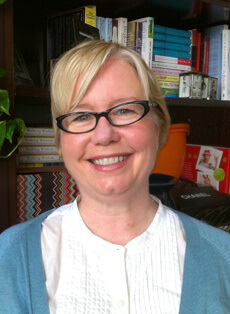 Brenda Copeland is an Executive Editor at St. Martin’s Press, where she has worked since 2010. Brenda publishes a vibrant mix of fiction and non-fiction, from the commercial to the literary, and looks for strong stories told with a strong voice. Current authors include Matthew Dicks, author of Memoirs of an Imaginary Friend, Ann Leary, author of The Good House, and Amy Sue Nathan, whose debut novel The Glass Wives will come out in summer, 2013. Over the course of her career Brenda has published such bestselling authors as Dean Koontz, Claire Cooke, Cecily Von Ziegesar, Melissa de la Cruz, as well as Gotham and Deepak Chopra. Brenda teaches book editing at New York University.
Brenda Copeland is an Executive Editor at St. Martin’s Press, where she has worked since 2010. Brenda publishes a vibrant mix of fiction and non-fiction, from the commercial to the literary, and looks for strong stories told with a strong voice. Current authors include Matthew Dicks, author of Memoirs of an Imaginary Friend, Ann Leary, author of The Good House, and Amy Sue Nathan, whose debut novel The Glass Wives will come out in summer, 2013. Over the course of her career Brenda has published such bestselling authors as Dean Koontz, Claire Cooke, Cecily Von Ziegesar, Melissa de la Cruz, as well as Gotham and Deepak Chopra. Brenda teaches book editing at New York University.
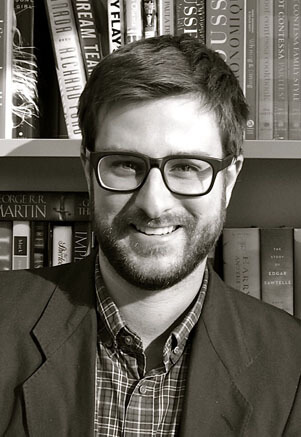 Ryan Doherty is a Senior Editor at Spiegel & Grau, an imprint of the Random House Publishing Group. He is interested in platform and voice driven narrative non-fiction. His eclectic interests in non-fiction include history, personal narrative, popular culture, science, food, music, blog trend titles, humor and biography.Other special interests include debut literary fiction. In the five-plus years that he has been at Random House, Ryan has edited a number of bestselling titles including Loon by Jack McLean, Life as I Blow It by Sarah Colonna, as well as the NBCC Award-winning memoir Half a Life by Darin Strauss. He also has acquired the forthcoming The Mushroom Hunters by Langdon Cook, an authorized biography of Jim Henson by Brian Jay Jones.
Ryan Doherty is a Senior Editor at Spiegel & Grau, an imprint of the Random House Publishing Group. He is interested in platform and voice driven narrative non-fiction. His eclectic interests in non-fiction include history, personal narrative, popular culture, science, food, music, blog trend titles, humor and biography.Other special interests include debut literary fiction. In the five-plus years that he has been at Random House, Ryan has edited a number of bestselling titles including Loon by Jack McLean, Life as I Blow It by Sarah Colonna, as well as the NBCC Award-winning memoir Half a Life by Darin Strauss. He also has acquired the forthcoming The Mushroom Hunters by Langdon Cook, an authorized biography of Jim Henson by Brian Jay Jones.
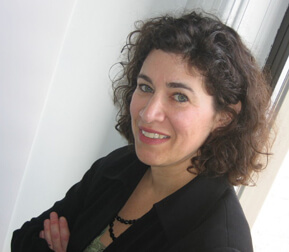 Amy Gash is a Senior Editor in the New York office of Algonquin Books, where she has acquired literary fiction and narrative nonfiction for the past 15 years. She has edited Ariel Sabar’s My Father’s Paradise: A Son’s Search for His Family’s Past, which won the National Book Critics Circle Award for Autobiography, the NYT bestseller Work Hard, Be Nice: How Two Inspired Teachers Created the Most Promising School in America by Jay Mathews. A forthcoming novel, The Art Forger by B.A. Shapiro, is the #1 Indie Next Pick this November. What connects all her diverse projects is each author’s distinct voice. Before arriving at Algonquin, Amy worked at HarperCollins and Random House.
Amy Gash is a Senior Editor in the New York office of Algonquin Books, where she has acquired literary fiction and narrative nonfiction for the past 15 years. She has edited Ariel Sabar’s My Father’s Paradise: A Son’s Search for His Family’s Past, which won the National Book Critics Circle Award for Autobiography, the NYT bestseller Work Hard, Be Nice: How Two Inspired Teachers Created the Most Promising School in America by Jay Mathews. A forthcoming novel, The Art Forger by B.A. Shapiro, is the #1 Indie Next Pick this November. What connects all her diverse projects is each author’s distinct voice. Before arriving at Algonquin, Amy worked at HarperCollins and Random House.
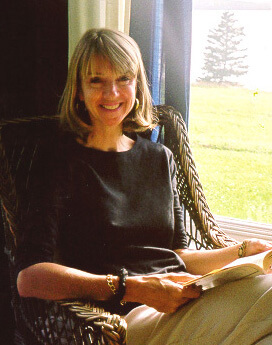 Deborah Grosvenor has worked in book publishing for more than 20 years as an editor and literary agent. During her career, Grosvenor has edited or represented several hundred fiction and nonfiction books in the areas of history, biography, politics, current affairs, memoir, the environment, the military, the South, and science, among others. Her best-known acquisition as an editor was a first novel, The Hunt for Red October by Tom Clancy. Deborah also signed up the debut work of bestselling author Homer Hickham, Torpedo Junction, and helped launch bestselling author Stephen Coonts’s first novel, Flight of the Intruder. Deborah owns the Grosvenor Literary Agency.
Deborah Grosvenor has worked in book publishing for more than 20 years as an editor and literary agent. During her career, Grosvenor has edited or represented several hundred fiction and nonfiction books in the areas of history, biography, politics, current affairs, memoir, the environment, the military, the South, and science, among others. Her best-known acquisition as an editor was a first novel, The Hunt for Red October by Tom Clancy. Deborah also signed up the debut work of bestselling author Homer Hickham, Torpedo Junction, and helped launch bestselling author Stephen Coonts’s first novel, Flight of the Intruder. Deborah owns the Grosvenor Literary Agency.
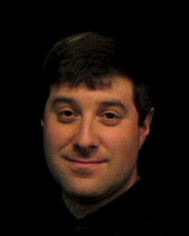 Jeff Kleinman is a literary agent, intellectual property attorney, and founding partner of Folio Literary Management, LLC, a New York literary agency which works with all of the major U.S. publishers (and, through subagents) with most international publishers. His authors include Garth Stein, Robert Hicks, Charles Shields, Bruce Watson, Neil White, Philip Gerard, and the late Dean Faulkner Wells. His interestes include nonfiction: especially narrative nonfiction with a historical bent, but also memoir, health, parenting, aging, nature, pets, how-to, nature, science, politics, military, espionage, equestrian, biography. His fiction interests include very well-written, character-driven novels; some suspense, thrillers; otherwise mainstream commercial and literary fiction.
Jeff Kleinman is a literary agent, intellectual property attorney, and founding partner of Folio Literary Management, LLC, a New York literary agency which works with all of the major U.S. publishers (and, through subagents) with most international publishers. His authors include Garth Stein, Robert Hicks, Charles Shields, Bruce Watson, Neil White, Philip Gerard, and the late Dean Faulkner Wells. His interestes include nonfiction: especially narrative nonfiction with a historical bent, but also memoir, health, parenting, aging, nature, pets, how-to, nature, science, politics, military, espionage, equestrian, biography. His fiction interests include very well-written, character-driven novels; some suspense, thrillers; otherwise mainstream commercial and literary fiction.
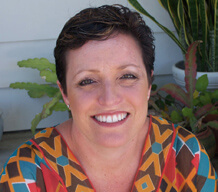 Jill Marr is an acquiring associate agent at the Sandra Dijkstra Literary Agency. She has a strong Internet and media background as well as more than ten years of publishing experience. Jill is interested in commercial fiction, with an emphasis on mysteries, thrillers and horror, women’s commercial fiction and historical fiction. She also is looking for non-fiction by authors who are getting their work published regularly and who have a realistic sense of the market and their audience. Jill is looking for non-fiction projects in the areas of history, sports, politics, current events, self-help, inspirational, cookbooks, memoir (she especially loves travel and foodie memoirs), health & nutrition, pop culture, humor and music.
Jill Marr is an acquiring associate agent at the Sandra Dijkstra Literary Agency. She has a strong Internet and media background as well as more than ten years of publishing experience. Jill is interested in commercial fiction, with an emphasis on mysteries, thrillers and horror, women’s commercial fiction and historical fiction. She also is looking for non-fiction by authors who are getting their work published regularly and who have a realistic sense of the market and their audience. Jill is looking for non-fiction projects in the areas of history, sports, politics, current events, self-help, inspirational, cookbooks, memoir (she especially loves travel and foodie memoirs), health & nutrition, pop culture, humor and music.
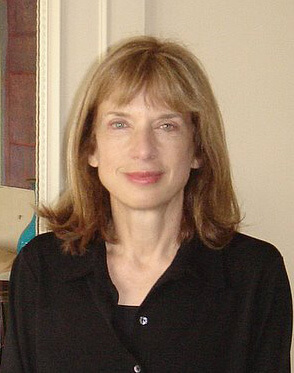 Susanna L. Porter, Vice President and Executive Editor in the Random House Publishing Group, is noted for her success in acquiring historical fiction, including several novels written from the perspective of women. Her most recent success is The Paris Wife, Paula McLain’s bestselling novel. Ms. Porter has recently acquired Ms. McLain’s next book, which will focus on the life of another noted woman, Marie Curie. Similarly, Ms. Porter was the acquiring editor for Anne Fortier’s novel Juliet, which focuses on the heroine of Shakespeare’s play Romeo & Juliet, and Nancy Horan’s bestselling novel Loving Frank, which is about famous architect Frank Lloyd Wright as seen through the character of his mistress.
Susanna L. Porter, Vice President and Executive Editor in the Random House Publishing Group, is noted for her success in acquiring historical fiction, including several novels written from the perspective of women. Her most recent success is The Paris Wife, Paula McLain’s bestselling novel. Ms. Porter has recently acquired Ms. McLain’s next book, which will focus on the life of another noted woman, Marie Curie. Similarly, Ms. Porter was the acquiring editor for Anne Fortier’s novel Juliet, which focuses on the heroine of Shakespeare’s play Romeo & Juliet, and Nancy Horan’s bestselling novel Loving Frank, which is about famous architect Frank Lloyd Wright as seen through the character of his mistress.
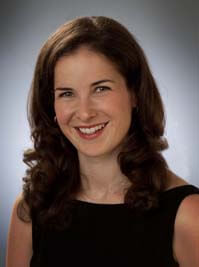 Ginny Smith Younce, a native of Macon, GA, is a Senior Editor at The Penguin Press and has worked with authors including Daniel Yergin, Pamela Druckerman, Gary Marcus, Rana Dasgupta, Emily Oster, Marja Mills, Ann Napolitano, Paula Broadwell, Gay Talese, Kenji Yoshino, Andrew Delbanco, Daniel J. Sharfstein, Jeet Thayil, Edward Behr, Mario Batali, Jessica Stern, Simon Schama, Thurston Clarke, Steven Solomon, Sue Roe, and Nate Silver. Prior to coming to Penguin, she worked at Ecco/HarperCollins and Simon & Schuster.
Ginny Smith Younce, a native of Macon, GA, is a Senior Editor at The Penguin Press and has worked with authors including Daniel Yergin, Pamela Druckerman, Gary Marcus, Rana Dasgupta, Emily Oster, Marja Mills, Ann Napolitano, Paula Broadwell, Gay Talese, Kenji Yoshino, Andrew Delbanco, Daniel J. Sharfstein, Jeet Thayil, Edward Behr, Mario Batali, Jessica Stern, Simon Schama, Thurston Clarke, Steven Solomon, Sue Roe, and Nate Silver. Prior to coming to Penguin, she worked at Ecco/HarperCollins and Simon & Schuster.
 Webster Younce has most recently been a Senior Editor at Free Press/Simon & Schuster, with previously held senior editor posts at Henry Holt, Houghton Mifflin, and Suhrkamp Verlag in Berlin, Germany, where he was responsible for Suhrkamp’s English-language and international literature program. His authors have included James Kynge (China Shakes the World, winner of the FT/Goldman Sachs Business Book of the Year); Whitbread Award-winning historian John Guy (A Daughter’s Love: Thomas More and His Dearest Meg); Joseph Epstein (Friendship: An Exposé); Paul Theroux (Ghost Train to the Eastern Star); Ward Just (Forgetfulness) and Jonathan Miles (Dear American Airlines).
Webster Younce has most recently been a Senior Editor at Free Press/Simon & Schuster, with previously held senior editor posts at Henry Holt, Houghton Mifflin, and Suhrkamp Verlag in Berlin, Germany, where he was responsible for Suhrkamp’s English-language and international literature program. His authors have included James Kynge (China Shakes the World, winner of the FT/Goldman Sachs Business Book of the Year); Whitbread Award-winning historian John Guy (A Daughter’s Love: Thomas More and His Dearest Meg); Joseph Epstein (Friendship: An Exposé); Paul Theroux (Ghost Train to the Eastern Star); Ward Just (Forgetfulness) and Jonathan Miles (Dear American Airlines).

JK: A lot of agents and editors write back to the author, “I didn’t quite fall in love with the project.” What do you mean by that, in plain English?
Brandi Bowles, Agent: You said plain English so the most simple way I can put it is, do I want to keep reading? Do I get on the subway and continue reading? Do I miss my stop because I’m reading? Then I’ve fallen in love.
WOW! Just goes to show the subjectivity of it all. Because we all can’t fall in love with the same book, place or person.
Well, unless it’s Johnny Depp 🙂 There are always exceptions…
Voice? I’m a thunderous barritone, so I should be fine. 🙂
Fantastic – you’ll no doubt be a HIT! LOL… thanks for the giggle…
I see April Eberhardt’s picture there. I’m sure she had lots to say as well; she’s always a great advocate for writers!
She is and she was wonderful the entire week!